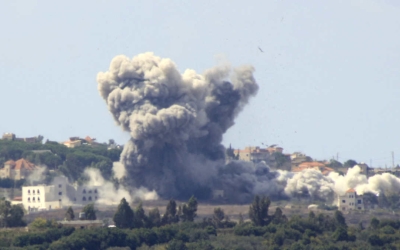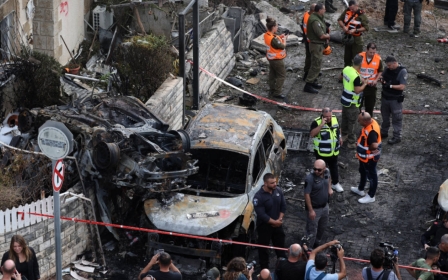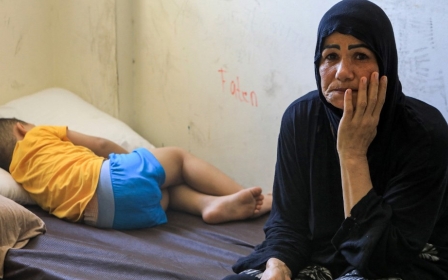Israel puts troops on alert for possible ground incursion into Lebanon

Israel told troops on Wednesday to prepare for a potential ground incursion of Lebanon, as US President Joe Biden warned that an "all-out war is possible".
Israel's General Herzi Halevi told soldiers that Israel’s air strikes on Lebanon were being conducted “to prepare the ground for your possible entry” into Lebanon.
“We are preparing the process of a manoeuvre, which means your military boots, your manoeuvring boots, will enter enemy territory, enter villages that Hizbollah has prepared as large military outposts,” according to a statement from the military.
Halevi’s remarks came as Israel called up two reserve brigades to serve in the north, saying their activation would “enable the continuation of combat” against Hezbollah.
Hezbollah and Israel are embroiled in the most intense exchange of fire since their full-scale war in 2006.
New MEE newsletter: Jerusalem Dispatch
Sign up to get the latest insights and analysis on Israel-Palestine, alongside Turkey Unpacked and other MEE newsletters
On Wednesday Hezbollah fired a ballistic missile at Tel Aviv for the first time. Hezbollah said its Qader 1 ballistic missile targeted the headquarters of Israel’s Mossad intelligence agency on the outskirts of Tel Aviv.
Fighting seriously escalated after Israel detonated thousands of pagers and walkie-talkies used by Hezbollah members last week.
In a sign of the risk of rising tensions, a US official confirmed to Middle East Eye that US troops have been deployed to Cyprus for "contingency plans", in the event US citizens have to be evacuated from Lebanon.
On Monday Israel launched widespread air strikes against what it said were Hezbollah fighters, missile sites and arms warehouses. The attacks have killed at least 600 people.
Israel’s attacks were initially concentrated in southern Lebanon and the Bekaa Valley, the traditional heartlands of Hezbollah, but on Wednesday they were expanded to the northern suburbs of Beirut and parts of Mount Lebanon.
At least 90,530 people have fled the strikes, the International Organisation for Migration has said.
The escalation is a major challenge to the Biden administration.
Middle East Eye revealed on Tuesday that Israel submitted a three-page request for munitions and arms to refill existing stockpiles, underscoring how it may be girding for a longer war.
One senior US official and a former US official told MEE that the White House and State Department were slow-rolling the request amid anger at Israel as it escalates in Lebanon.
The White House previously froze a small batch of arms shipments to Israel, saying it was designed to prevent an invasion of Rafah in southern Gaza. Israel invaded the city and the US resumed one of the frozen shipments.
Since the 7 October Hamas-led attacks on southern Israel, US diplomats have tried to achieve a ceasefire in Gaza in the hope it would prevent a regional war, but a deal has proven elusive.
"An all-out war is possible," Biden said on ABC News on Wednesday, adding, “What I think is, also, the opportunity is still in play to have a settlement that could fundamentally change the whole region.”
Israel and Hamas have been relatively quiet about the talks as the world’s attention shifts to Lebanon. With barely a month left until the US presidential election, some analysts say Israel may decide it should wait for a new administration to weigh a ceasefire in Gaza.
But fighting between Hezbollah and Israel has put the region on a knife's edge.
Biden suggested on Wednesday, however, that a ceasefire could be possible in Lebanon despite the lack of progress in Gaza.
"They have a possibility. I don't want to exaggerate it. There's a possibility if we can deal with a ceasefire in Lebanon that it can move into dealing with the West Bank as well.”
Middle East Eye delivers independent and unrivalled coverage and analysis of the Middle East, North Africa and beyond. To learn more about republishing this content and the associated fees, please fill out this form. More about MEE can be found here.





